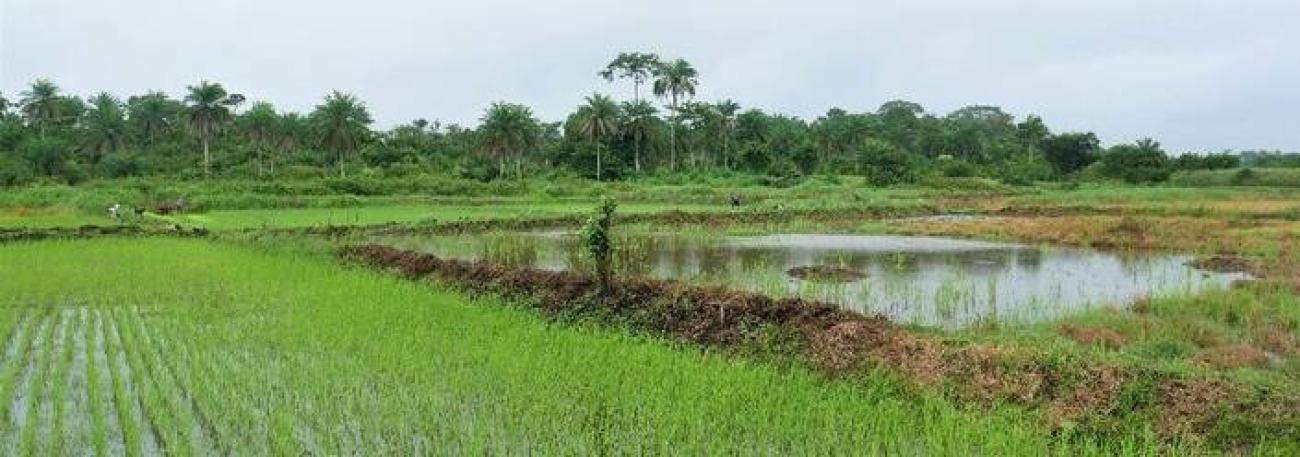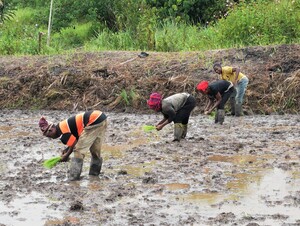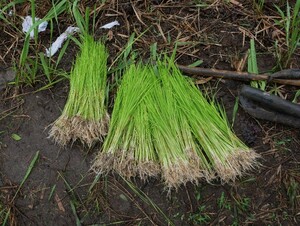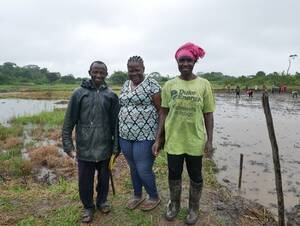Cultivating Change for Women's Livelihoods and Agricultural Production in Liberia

Nestled in the heart of Melekie in Bong County, the War Affected Women Multi-Purpose Cooperative (WAWMC) thrives as a symbol of resilience and progress.
Comprising 52 dedicated members (out of which 86% are women) hailing from diverse surrounding communities, the cooperative was founded in 2005 and registered as a corporate entity, being incorporated under the Cooperative Development Agency (CDA) in Liberia. It manages a sprawling 65-hectare farmland, nurturing the growth of rice, cassava, and a multitude of other crops.
Under the project “Linking Extension and Research to Farmers for Sustainable Agriculture, Food Security and Nutrition,” funded by the European Union (EU), FAO in collaboration with the Ministry of Agriculture and Central Agriculture Research Institute (CARI) supported the cooperative to embark on a transformative mission to rice farming practices in the community and in the country, making them more sustainable and productive.
The cooperative also set up business service center and established a rice demonstration plot. There, they tested rice seeds and experimented with sustainable planting and harvesting techniques tailored to the characteristics of the rice variety with full support of CARI. side FAO's team of experts also provided hands-on technical training on sustainable crop production practices, post-harvest management, processing and marketing to member farmers.
In addition, leadership skills training on business management was designed to empower the farmers with skills directly applicable to manage their farming system as a business activity. The agriculture innovations up-scaling contextually relevant technologies will improve the production of the surrounding communities.

- Cooperative members are transplanting. ©FAO

- Seedlings for transplanting. ©FAO
Adoption of improved farming methods and practices
"We learned from the training how to enhance our farming methods, so we use those methods,” said James P. Yarkpawoo, a production manager WAWMC, who is a graduate from Cuttington University in Liberia with a bachelor’s degree in plant and soil science.
He was moved to join the team in 2021 by the cooperative’s strong focus and commitment to succeed. Within the team, he provides technical backstopping, which was lacking in the cooperative, to advance rice production in order to ensure people in the community and the country are adequately fed.
James enthusiastically voiced his excitement about the advancements in their farming methods. He explained that they used to overcrowd rice on the nurseries which led to undernourished seedlings and randomly transplanted in rice field. Now, they have optimized it to 20 by 20, 25 by 25, and 30 by 30 centimeters, aligning with the specific requirements of their chosen rice variety.
It was on a rainy afternoon, 10 August 2023, that the members of the community were at work on the rice fields. It was an important day for rice transplanting that could not be missed.
“Today marks the prime time for transplanting,” James continued. "We've learned that it should be done just after 14-15 days from nursery planting. Previously, we used to transplant after 21 days, but we changed our approach to ensure better yields."
“The technical training taught us how to select suitable plots, determine optimal transplanting timing, and more for sustainable agricultural practices. Previously when our rice plants faced overcrowding, we used excessive fertilizers. Now, we've adopted the right spacing for the specific rice variety."

- James P. Yarkpawoo (right), Ma Musu Barto, (center), and Varbah Miabah, WAWMC co-chair (left). ©FAO
Empowerment of Women through enhanced access to productive resources
“Before, women were denied in education,” says Musu Barto, the chairperson of the War Affected Women Multi-Purpose Cooperative, “that is why we started the cooperative to pull women together, to share ideas, for instance on how to take care of our children, how to advocate for rights to own properties.”
She is proud of the community and strength that women have gained through the years of hardworking, sharing and collective efforts.
“Now, women have access to production resources, and knowledge. We can save money and can send our children to school.”
FAO’s technical support to organize and manage Village Saving and Loan Associations (VSLA) for women and set up a warehouse to manage the resources and harvests under previous projects was what they continue to sustain and grow.
“Today, we are doing agriculture not only for consuming, but for business. We are supplying to school feeding program, and this has improved our income levels and livelihoods too.”
Through the partnership, capacity development programs, and continuous learning on the demonstration ground, they have not only cultivated fields but also sown the seeds of empowerment, and hope in their locality and could inspire change in other places across Liberia.
About the project
Project “Linking Extension and Research to Farmers for Sustainable Agriculture, Food Security and Nutrition,” funded by European Union (EU), implemented in 2019-2023. The project aimed at strengthening the linkages between research and extension service providers, higher level education institutions, farmers, and other value chain actors in the country to enhance effective and sustainable agriculture production and promoting food security.

